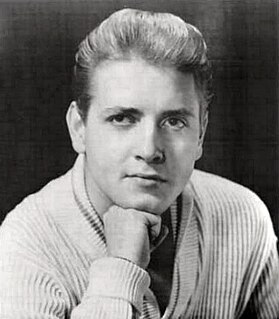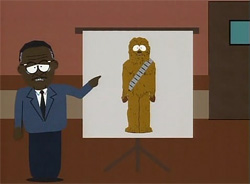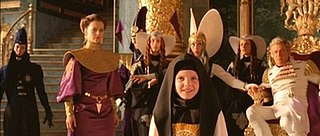
Wycliffe and the Dunes Mystery (1993) is a crime novel by Cornish writer W. J. Burley. [1]

Wycliffe and the Dunes Mystery (1993) is a crime novel by Cornish writer W. J. Burley. [1]
Fifteen years ago, Cochran Wilder supposedly vanished during a walking holiday in Cornwall just after being released from a psychiatric hospital, where he was incarcerated after successfully pleading insanity for an indecent assault charge. His father, a prominent member of parliament, regards his son as a horrible embarrassment, and is in for more professional strife when Cochran's murdered body is found buried deep inside a sand dune.
Wycliffe suspects one (or possibly even all) of six figureheads in the local community, who had been spending an illicit weekend at a Chalet near the scene of Cohran's grisly end. When a series of threatening communications begin circulating and a second murder is committed, the sleuth finds himself caught up in a deadly race against time...

Children of Dune is a 1976 science fiction novel by Frank Herbert, the third in his Dune series of six novels. It was originally serialized in Analog Science Fiction and Fact in 1976, and was the last Dune novel to be serialized before book publication.

John Wycliffe was an English scholastic philosopher, theologian, biblical translator, reformer, priest, and a seminary professor at the University of Oxford. He became an influential dissident within the Roman Catholic priesthood during the 14th century and is considered an important predecessor to Protestantism. Wycliffe questioned the privileged status of the clergy which had bolstered their powerful role in England and the luxury and pomp of local parishes and their ceremonies.

Dune is a 1965 science fiction novel by American author Frank Herbert, originally published as two separate serials in Analog magazine. It tied with Roger Zelazny's This Immortal for the Hugo Award in 1966 and it won the inaugural Nebula Award for Best Novel. It is the first installment of the Dune saga. In 2003, it was described as the world's best-selling science fiction novel.

Ray Edward Cochran was an American rock and roll musician. Cochran's songs, such as "Twenty Flight Rock", "Summertime Blues", "C'mon Everybody", and "Somethin' Else", captured teenage frustration and desire in the mid-1950s and early 1960s. He experimented with multitrack recording, distortion techniques, and overdubbing even on his earliest singles. He played the guitar, piano, bass, and drums. His image as a sharply dressed and attractive young man with a rebellious attitude epitomized the stance of the 1950s rocker, and in death he achieved iconic status.

In a jury trial, a Chewbacca defense is a legal strategy in which a criminal defense lawyer tries to confuse the jury rather than refute the case of the prosecutor. It is an intentional distraction or obfuscation.

Johnnie Lee Cochran Jr. was an American lawyer and civil activist best known for his leadership role in the defense and criminal acquittal of O. J. Simpson for the murder of his ex-wife Nicole Brown Simpson and her friend Ron Goldman. He often defended his client with rhymes like "if it doesn't fit, you must acquit!"

Wycliffe's Bible is the name now given to a group of Bible translations into Middle English that were made under the direction of John Wycliffe. They appeared over a period from approximately 1382 to 1395. These Bible translations were the chief inspiration and chief cause of the Lollard movement, a pre-Reformation movement that rejected many of the distinctive teachings of the Roman Catholic Church. In the early Middle Ages, most Western Christian people encountered the Bible only in the form of oral versions of scriptures, verses and homilies in Latin. Though relatively few people could read at this time, Wycliffe's idea was to translate the Bible into the vernacular, saying "it helpeth Christian men to study the Gospel in that tongue in which they know best Christ's sentence".

Dune: House Harkonnen is a 2000 science fiction novel by Brian Herbert and Kevin J. Anderson, set in the fictional Dune universe created by Frank Herbert. It is the second book in the Prelude to Dune prequel trilogy, which takes place before the events of Frank Herbert's celebrated 1965 novel Dune. The Prelude to Dune novels draw from notes left behind by Frank Herbert after his death.

Dune: House Corrino is a 2001 science fiction novel by Brian Herbert and Kevin J. Anderson, set in the fictional Dune universe created by Frank Herbert. It is the third book in the Prelude to Dune prequel trilogy, which takes place before the events of Frank Herbert's celebrated 1965 novel Dune. The Prelude to Dune novels draw from notes left behind by Frank Herbert after his death.

Dune, also known as the Dune Chronicles, is a science fiction media franchise that originated with the 1965 novel Dune by Frank Herbert and has continued to add new publications. Dune is frequently described as the best selling science fiction novel in history. It won the inaugural Nebula Award for Best Novel in 1965 and the 1966 Hugo Award, and was later adapted into a 1984 film, a 2000 television miniseries, and a 2021 film. Herbert wrote five sequels, the first two of which were adapted as a miniseries called Frank Herbert's Children of Dune in 2003. Dune has also inspired some traditional games and a series of video games. Since 2009, the names of planets from the Dune novels have been adopted for the real-world nomenclature of plains and other features on Saturn's moon Titan.

Garland Perry "Hank" Cochran was an American country music singer and songwriter. Starting during the 1960s, Cochran was a prolific songwriter in the genre, including major hits by Patsy Cline, Ray Price, Eddy Arnold and others. Cochran was also a recording artist between 1962 and 1980, scoring seven times on the Billboard country music charts, with his greatest solo success being the No. 20 "Sally Was a Good Old Girl." In 2014, he was inducted into the Country Music Hall of Fame.

Sandworms of Dune is a science fiction novel by American writers Brian Herbert and Kevin J. Anderson, the second of two books they wrote to conclude Frank Herbert's original Dune series. It is based on notes left behind by Frank Herbert for Dune 7, his own planned seventh novel in the Dune series. The novel was released on August 7, 2007.
The People of the State of California v. Orenthal James Simpson was a criminal trial in Los Angeles County Superior Court in which former National Football League (NFL) player, broadcaster and actor O. J. Simpson was tried and acquitted for the murders of his ex-wife Nicole Brown Simpson and her friend Ronald Goldman. The pair were stabbed to death outside Brown's condominium in the Brentwood neighborhood of Los Angeles on the night of June 12, 1994. The trial spanned eleven months, from the jury's swearing-in on November 9, 1994. Opening statements were made on January 24, 1995, and Simpson was acquitted of both counts of murder on October 3 of the same year. The trial is often characterized as the trial of the century because of its international publicity and has been described as the "most publicized" criminal trial in history.
William John Burley was a British crime writer, best known for his books featuring the detective Charles Wycliffe, which became the basis of the popular television series Wycliffe, shown from 1994 to 1998.

Wycliffe and the Last Rites (1992) is a crime novel by Cornish writer W. J. Burley featuring his series detective Charles Wycliffe.

Wycliffe and the House of Fear (1995) is a crime novel by Cornish writer W. J. Burley featuring detective Charles Wycliffe.

Wycliffe and the Tangled Web (1988) is a crime novel by Cornish writer W. J. Burley.
Numerous narratives and folk beliefs make up the ghostlore of Indiana, a U.S. state in the Midwest, and there are many locations that are considered to be haunted by locals. Some of the hauntings are celebrated in festivals, and most have some history behind them.

Multiple organizations of the Dune universe dominate the political, religious, and social arena of the setting of Frank Herbert's Dune series of science fiction novels, and derivative works. Set tens of thousands of years in the future, the saga chronicles a civilization which has banned computers but has also developed advanced technology and mental and physical abilities through physical training, eugenics and the use of the drug melange. Specialized groups of individuals have aligned themselves in organizations focusing on specific abilities, technology and goals. Herbert's concepts of human evolution and technology have been analyzed and deconstructed in at least one book, The Science of Dune (2008). His originating 1965 novel Dune is popularly considered one of the greatest science fiction novels of all time, and is frequently cited as the best-selling science fiction novel in history. Dune and its five sequels by Herbert explore the complex and multilayered interactions of politics, religion, ecology and technology, among other themes.
We've a three-point civilization: the Imperial Household balanced against the Federated Great Houses of the Landsraad, and between them, the Guild with its damnable monopoly on interstellar transport.